Maternal macronutrient and energy intake during pregnancy: a systematic review and meta-analysis
- PMID: 38360655
- PMCID: PMC10870573
- DOI: 10.1186/s12889-024-17862-x
Maternal macronutrient and energy intake during pregnancy: a systematic review and meta-analysis
Abstract
Background: Nutritional status during pregnancy can have a significant impact on infant and maternal health outcomes. To maintain maternal homeostasis and support fetal growth, adequate macronutrient and energy intake during pregnancy is essential. Therefore, this study sought to systematically review and meta-analyze macronutrient and energy intakes during pregnancy.
Methods: A systematic review and meta-analysis was carried out based on the PRISMA (Preferred Reporting Items for Systematic Reviews and Meta-Analyses) guidelines. The required data were collected from four databases including: Web of Sciences, ProQuest, Scopus, and PubMed, from 1 January 1980 to 30 May 2023, by using a combination of search terms (dietary pattern" OR "diet quality" OR "food habits" OR "nutrition surveys" OR "diet surveys" OR "food-frequency questionnaire" OR "diet record" OR "dietary recall") AND ( "pregnancy" OR "reproduction" OR "maternal health" OR "neonatal outcomes") among interventional and observational studies. Excel and STATA version 11 were used for data analysis.
Results: Among 7081 published articles, 54 studies were included in the review. Most of the 33 (61%) studies were cohort studies and a total of 135,566 pregnant women were included. The overall average of energy, carbohydrate, fat, and protein intake was 2036.10 kcal/day, 262.17 gr/day, 74.17 gr/day, and 78.21 gr/day, respectively. Also, energy intake during pregnancy was higher in American (2228.31 kcal/day, CI95%: 2135.06-2325.63) and Eastern Mediterranean regions (2226.70 kcal/day, CI95%: 2077.23-2386.92) than other regions (P < 0.001). Energy intake was higher in the third trimester than others (2115.64 kcal/day, CI95%: 1974.15-2267.27). Furthermore, based on the findings, there was a significant difference between energy intake in different World Health Organization (WHO) regions (P < 0.05).
Conclusions: According to the results of meta-analysis, the average total energy was below than average total energy required during pregnancy. More efforts are needed to encourage women to adopt healthy eating habits during pregnancy to support healthy fetal and infant development.
Keywords: Child health; Energy; Macronutrient; Maternal health; Maternal nutrition; Pregnancy.
© 2024. The Author(s).
Conflict of interest statement
The authors declare no competing interests.
Figures

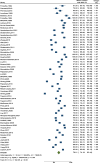
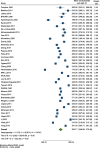
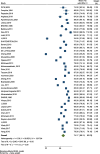
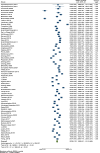
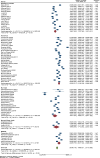
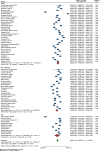
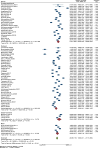
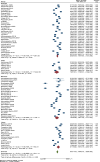
References
-
- Wubie A, Seid O, Eshetie S, Dagne S, Menber Y, Wasihun Y, et al. Determinants of chronic energy deficiency among non-pregnant and non-lactating women of reproductive age in rural Kebeles of Dera District, North West Ethiopia, 2019: Unmatched case control study. PLoS ONE. 2020;15(10):e0241341. doi: 10.1371/journal.pone.0241341. - DOI - PMC - PubMed
Publication types
MeSH terms
LinkOut - more resources
Full Text Sources

